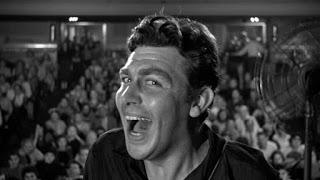
"I'm not just an entertainer. I'm an influence, a wielder of opinion, a force!"
Few films are as prescient as A Face in the Crowd (1957). Elia Kazan's bleak satire faced a frosty initial reception, despite launching Andy Griffith to stardom. Today it's rightly considered a classic, capturing what happens when entertainment, politics and personality collide.Talent scout Marcia Jeffries (Patricia) discovers Larry "Lonesome" Rhoads (Andy Griffith) in an Arkansas jail. Lonesome becomes a radio star, a skilled musician whose down-home earnestness commands the crowds. Lonesome's fame rapidly increases: he becomes a corporate spokesman and national television personality, moving to New York with his teenaged bride (Lee Remick). Soon Rhoads expands into politics, using his clout to push Senator Fuller (Marshall Neilan) into the White House.
From its start, A Face in the Crowd is a bracing experience. Lonesome makes a fascinating anti-hero, morphing from jailhouse troubadour to demagogue with ease. He emphasizes his downhome roots and homespun wisdom like a twisted Will Rogers, encouraging Southerners to raise money for an African-American widow, buy mattresses and health tonics. That Lonesome offers nothing more than tuneful songs and downhome jabber makes no difference; he's a charismatic tribune who masters mass media.
Kazan and writer Budd Schulberg show Lonesome's spiraling ambition and appetites intertwining. He romances Marcia until he meets a baton-twirler half his age. He even lectures seasoned politicos on how to run for office: "Respect doesn't sell!" Long before Joe McGinniss's The Selling of the President, Face shows politics reduced to marketing, Lonesome comparing Fuller to detergent. His craftiness proves a potent weapon in a gullible society, reducing issues to slogans and sound bites.
Given its bleakness, Face's denouement underwhelms. Lonesome has an on-air rant (modeled after a meltdown by broadcaster Arthur Godfrey), engineered by Marcia, insulting and losing his fans. Then Marcia's journalist friend (Walter Matthau) tells Lonesome off. He's reduced to fulminating before canned applause, an antihero martyred by media and his own big mouth. In a film that's largely avoided preachments, it's disappointing.
Andy Griffith makes a spellbinding film debut, miles from his family-friend TV persona. He explodes with manic, forceful energy, a fearsome creature of appetites, ego and reckless ambition. Patricia Neal's patented cynicism makes a good counterpart; Lee Remick (also debuting) plays Lonesome's underage wife. Walter Matthau plays a cynical journalist, Anthony Franciosa a sleazy agent. Various media personalities (singer Burl Ives, newscaster Mike Wallace, columnist Walter Winchell) play themselves.
A Face in the Crowd was both timely and prescient. In the decade of Richard Nixon's Checkers Speech and the televised Kefauver and McCarthy hearings, Kazan had much material to draw upon. But who could have guessed that sixty years later, we'd have a reality TV star as a presidential frontrunner?

